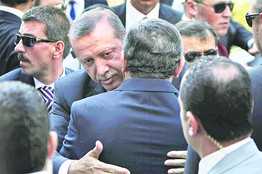By MARC CHAMPION And MATT BRADLEY
CAIRO—In Cairo’s Opera House on Tuesday, the standing ovations, chants and fist pumping from the audience began even before Turkey’s Prime Minister Recep Tayyip Erdogan stood up to speak.

When he got to threatening further retribution against Israel for its refusal to apologize over the killing of Turkish citizens during a scuffle on an aid ship last year, the audience roared.
Mr. Erdogan was on the first stop of an “Arab Spring” tour that will take him to Tunisia and Libya later this week, as he seeks to extend Turkey’s influence in the region using his own popularity and a tough line on Israel to draw support.
As vendors distributed posters of Mr. Erdogan and his face looked down from giant billboards in the city center, he seemed to be successful. “People in Egypt see him as the new Gamal Abdel Nasser,” said Mohamad Mosalam, a banker from Société Généralé in Egypt, referring to Egypt’s revered post-colonial president, who faced down Britain, France and Israel over control of the Suez Canal in 1956. “For 40 years [after Nasser], Arab people felt they had no leader.” Now, said Mr. Mosalam, they have Mr. Erdogan.
Speaking just blocks away from where U.S. President Barack Obama sought to persuade Arabs to trust America again in a speech on the Middle East two years ago, Mr. Erdogan also chided Washington. He called on the U.S. to rethink its plan to oppose Palestinian statehood in the United Nations this month.
That stance, said Mr. Erdogan, “does not fit the understanding of justice in U.S. foreign policy.” He went on to warn Arabs against adopting ideas from outside the region, without specifying what or whose ideas he was referring to.
Turkey’s prime minister sought to make common cause between Arabs and Turks. He stressed their common faith and history (during the Ottoman Empire), their desire for democracy and above all, common opposition to Israel’s treatment of Palestinians.
Israel, he said in an address to Arab League foreign ministers earlier Tuesday, “is going to lose in the end.”
Israeli officials have said they believe Mr. Erdogan’s recent downgrading of diplomatic relations with Israel and sharp rhetoric are designed specifically to boost his stature in the Middle East in the wake of the Arab Spring. Turkish officials say the moves are linked solely to Israel’s refusal to apologize for the deaths of its citizens on the ship.
Turkey’s outspoken leader called Tuesday for close partnership — including military — between Egypt and Turkey, two of the region’s most populous Muslim countries. He pledged to boost trade to $5 billion from $3 billion today, within five years. And he signed 11 agreements with Egypt’s transitional government, covering areas from energy to the creation of a new joint High Security and Cooperation Council.
But there were also signs of the potential limitations to Mr. Erdogan’s bid for leadership in the Arab world.
His visit came at a sensitive time for Egypt’s interim military leaders, who have reached the nadir of their post-revolutionary prestige. In the past week, the military has announced a wider remit for Egypt’s 30-year old emergency law while cracking down on media groups that it considered to be inciting public disorder.
So far, the military has acted as a conservative counterweight to those Egyptian voices who would like to see a bolder foreign policy. That triggered popular anger, in particular, when the military tried to protect Israel’s embassy rather than expel its diplomats after Israeli forces killed six Egyptian border guards earlier this month.
“They don’t want to go in clashes with the U.S. and Israel so I don’t think that there will be a good and solid feedback from Erdogan’s visit with Egypt,” said Bashir Abdel Fattah, a Turkey expert at the government-financed Al Ahram Center for Political and Strategic Studies. Indeed on Tuesday, Mr. Erdogan called several times for democratic forms not to be held back, without specifying to whom he was referring.
“I don’t think it could be a beginning of an alliance between Egypt and Turkey in the future, because both countries know that there are limits between cooperation,” said Mr. Fattah.
Mr. Erdogan also had to tread carefully with regard to Syria, which he didn’t even mention in his address to the Arab League foreign ministers.
Outside the building, meanwhile, Syrian activists protested against Mr. Erdogan’s stance, which they saw as too accommodating to President Bashar Al-Assad.
Speaking to ordinary Egyptians at the Opera house, however, Mr. Erdogan attacked the Syrian president by name. “Now the Syrian people do not believe Al Assad. I don’t either,” said Mr. Erdogan. “A leader that murders his people loses his legitimacy.”
—Ayla Albayrak contributed to this article.
Write to Marc Champion at marc.champion@wsj.com
via Erdogan Seeks Closer Ties With New Arab Rulers – WSJ.com.

Leave a Reply